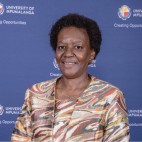Internationally acclaimed novellist Philip Pullman has said, “Children need to go to the theatre as much as they need to run about in the fresh air.” The national centre of the International Association of Theatres for Children and Young People (ASSITEJ South Africa) passionately supports this belief and has designed the Theatre4Youth programme to ensure every child and young person in our country has the opportunity to access and enjoy theatre wherever they may live.
The Theatre4Youth programme includes ongoing engagement between artists and schools, as well as an Internet-based and print catalogue, which together provide a rich resource of information and materials to help bridge the gap between theatre and education.
The website, www.theatre4youth.co.za, is a powerful interactive tool that facilitates companies in taking high-quality arts experiences into schools (or other spaces where children and young people meet). It brings together artists across the country in a national online database, cutting down on administration and marketing costs and making interested schools more accessible to artists.
The Theatre4Youth catalogues allow schools to search for theatre work that is relevant to the age group, languages or interests of their learners. All productions are fully searchable for such features as connections to the curriculum, and the themes explored. Schools can order productions directly from theatre companies through the website, or find theatre artists who are interested and willing to come and run workshops for their learners. The programme further encourages schools to participate in artistic and cultural activities, based at theatre houses, community spaces and festivals.
On 6 December, the Theatre4Youth Forum at the Goethe Institute, Johannesburg, kick-starts a dialogue between artists, educators, government, funders, media and other supporting bodies in order to engage in bridging the divides between theatre and education.
The forum will pay attention to the needs of educators, learners, theatre companies and artists, as well as explore innovative strategies being employed to overcome current challenges. Speakers and panel discussion hosts include Sindiwe Magona, Gcina Mhlophe, Vanessa Bower, Ismail Mahomed, Pamela Tancsik, Omphile Molusi, Yvette Hardie and Dale Smith. ASSITEJ South Africa will present a pilot research report on the status of the arts in South African schools, and the ways in which theatre companies are currently dealing with these challenges.
This research is important, as the majority of studies have taken place internationally, and have not been contextualised within the particular circumstances of our country. MacArthur Foundation’s “The Champions of Change: The Impact of the Arts on Learning”, a significant research project done over a number of years, reveals that "when young people study the arts, they show heightened academic standing, a strong capacity for self-assessment and a secure sense of their own ability to plan and work for a positive future”.
Learners with exposure to the arts did better in subjects such as mathematics and sciences, as well as in the more obviously connected fields such as languages and the humanities. Researchers found a remarkable consensus in their findings across independent projects, namely: the arts reach learners who are not otherwise being reached; the arts reach learners in ways that they are not otherwise being reached; the arts connect learners to themselves and each other; the arts transform the environment for learning, changing school cultures and making space for discovery and creativity across the curriculum; and the arts connect learning experiences to the world of real work.
Today in South Africa, we have compulsory arts education in all schools for Grades R to 9. This sets us apart and ahead of many other countries in both the developed and developing world. The general state of dysfunction in which education finds itself does not help implementation of any subject, and certainly not of those subjects considered by the majority of teachers to be less important. Most teachers and principals themselves have not experienced arts education at school, thus, for them, it is not understood or prioritised.
There are many other challenges to implementation, including the lack of facilities, space and staff provisioning; inadequately trained educators with little or no experience in the arts; the issues of norms and standards in schools, which affect delivery of education on all levels; limited curriculum time for arts processes; and a lack of access to seeing and experiencing high-quality art forms, either in schools or theatres.
It is for these reasons that the Theatre4Youth programme is so important; it offers a practical way forward for artists to share the tremendous benefits of their work with children and young people. ASSITEJ South Africa invites participation in the programme from all stakeholders with an interest in ensuring the arts become an accessible and inspirational resource in our schools – a resource for the teaching of every subject, and for the development of the heart, mind, body and spirit of every child.






